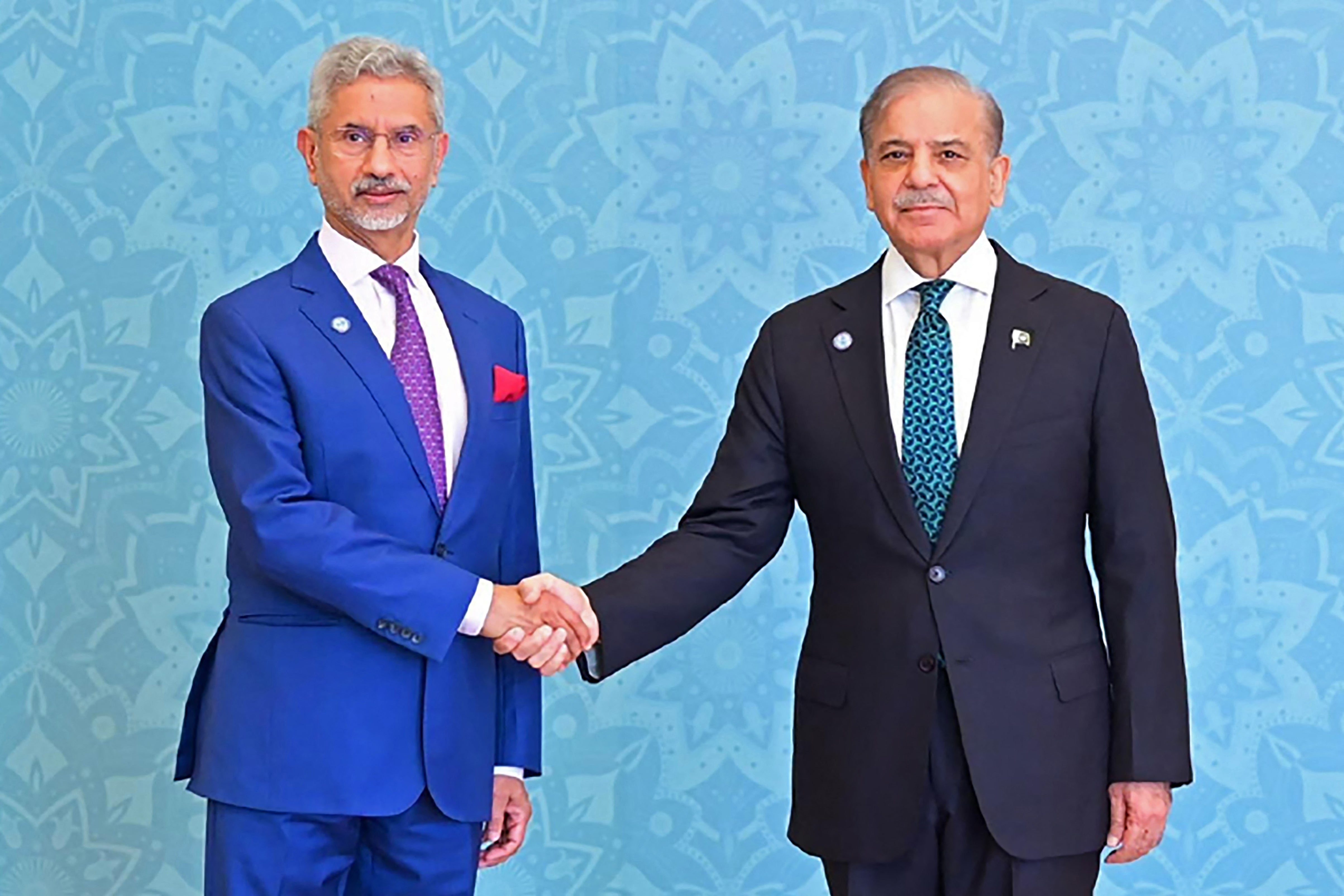Former PM Sharif says Pakistan and India should ‘bury the past’ after successful visit
Former prime minister says Indian foreign minister’s visit for SCO summit is a ‘good opening’
Former Pakistani prime minister Nawaz Sharif said he was optimistic relations with India could be mended following the recent visit of the rival country’s foreign minister S Jaishankar.
He said the hostile neighbours should “bury the past” and “think of the future”. In this regard, he said, Mr Jaishankar’s visit was a “good beginning” and a “good opening”.
Mr Sharif’s party leads Pakistan’s ruling coalition and his brother is the prime minister. He’s therefore seen as wielding considerable influence in the country.
Mr Jaishankar’s visit this week to attend the Shanghai Cooperation Organisation summit in Islamabad was the first trip by a high-ranking Indian minister to Pakistan in nearly nine years.
The meeting of the SCO, a Eurasian political and security grouping led by China, ended on Wednesday. It was the highest-profile multilateral event hosted by the troubled South Asian nation in years.
It was attended by Chinese premier Li Qiang, Russian prime minister Mikhail Mishustin as well as top representatives of member states such as Iran, Kazakhstan, Kyrgyzstan, Tajikistan, and Uzbekistan.
Speaking to Indian journalists travelling with Mr Jaishankar, Mr Sharif stressed the need for New Delhi and Islamabad to engage and move forward.
“This is how talks move forward, talks should not stop, it would have been better if Mr Modi had come himself,” he said, meaning prime minister Narendra Modi.
Mr Modi’s unscheduled visit to Pakistan in late 2015 for Mr Sharif’s birthday was a positive moment in bilateral ties, the former prime minister said, and lamented the “long pause” that has since affected relations.
“We can’t change our neighbours, neither can Pakistan nor can India. We should learn to live like good neighbours. We should not go into the past and should look to the future,” he said.
India and Pakistan had been in conflict for 75 years, and it was crucial not to let this animosity persist for another seven decades, he said, adding: “Both sides should sit down and discuss how to go forward.”

Reflecting on Mr Modi’s 2015 visit to Lahore, Mr Sharif, who was then prime minister, said: “Modi’s visit was a pleasant surprise. He called from Kabul and wanted to wish me. He came to my home, met my mother, wife who have since passed. It wasn’t a small gesture, they mean something to us, especially in our countries. We should not overlook them.”
Mr Sharif blamed the breakdown in communication between the two countries on former prime minister Imran Khan, especially his remarks directed at Mr Modi.
“Imran Khan used words that destroyed the relationship. As leaders of neighbouring countries, we should not even contemplate such language," he said, referencing a post of Mr Khan from September 2018.
Mr Khan had taken to X to lash out at the Indian prime minister after New Delhi cancelled a meeting of foreign ministers in New York.
“Disappointed at the arrogant & negative response by India to my call for resumption of the peace dialogue,” he had written. “However, all my life I have come across small men occupying big offices who do not have the vision to see the larger picture.”
The meeting was called off after Pakistani troops killed an Indian soldier and because Islamabad had released 20 postage stamps “glorifying” Burhan Wani, a militant in Kashmir who was killed in the summer of 2016, triggering months-long mass protests in the restive Himalayan valley.
Mr Khan was removed from power and imprisoned in 2022 through a parliamentary vote of no confidence, a move which he has alleged was orchestrated by Pakistan’s powerful military at the behest of the US. The US has denied the allegation.
Mr Khan’s party was barred from contesting the 2024 election, but independent candidates backed by it still won a large number of seats even though the process was widely seen to have been rigged by the military in favour of Mr Sharif’s party.
Mr Sharif underlined the importance of resuming trade and cricket as a pathway to thaw the frosty relationship with India. Trade has been on hold since 2019 after the Indian government imposed heavy tariffs on imports from Pakistan in the aftermath of the Pulwama attack in which 40 Indian paramilitary personnel were killed in a bomb attack on their convoy in Kashmir.
Mr Jaishankar earlier hinted that the relationship would improve only if Pakistan controlled what India alleges is its support for cross-border terrorism.
“Our endeavours will progress only when our commitment to the charter remains firm,” he said in his address at the SCO summit.
“As the charter spells out, this means being firm and uncompromising in countering the three evils. If activities across borders are characterised by terrorism, extremism and separatism, they are hardly likely to encourage trade, energy flows, connectivity and people-to-people exchanges in parallel.”
Cooperation, he added, “must be based on mutual respect and sovereign equality”.
“It should recognise territorial integrity and sovereignty. It must be built on genuine partnerships, not unilateral agendas. It cannot progress if we cherrypick global practices, especially of trade and transit.”
Join our commenting forum
Join thought-provoking conversations, follow other Independent readers and see their replies
Comments
Bookmark popover
Removed from bookmarks